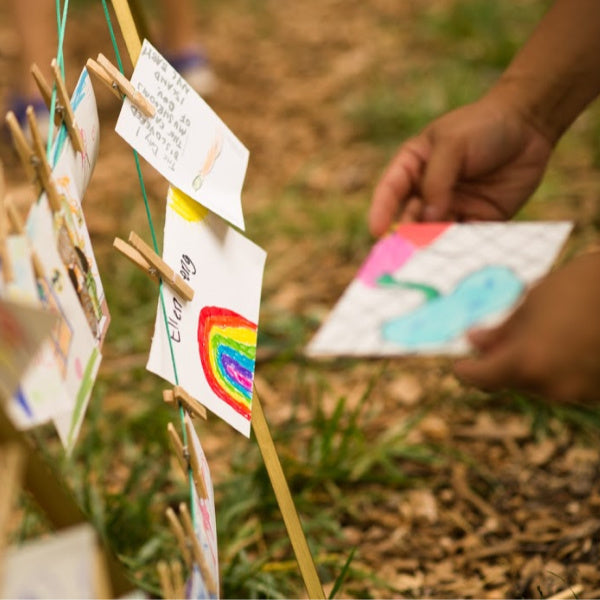2018 Figment NYC. Art Project: "Everything You Never Want To Forget" by Stacey Kahn and Stephanie Socolick. Photo: Adela Wagner
Is it possible for one nonprofit arts event to embody, contain, and command the creative energy of an entire culture? Seems a bit much.
But consider Figment.
Launched in 2007 with the goal of creating a one-time free arts event that about 500 people attended on a demilitarized island in New York Harbor only accessible via ferry, it has, as of this year, celebrated 70 events in 20 cities in 5 countries.
"We started it when people were still looking to go out and socialize," David Koren, the founder and director of the event-turned-movement says. "In 2007, the biggest concern was, 'How can we get ravers to come to an alcohol and drug-free event during the day?' Our first Figment event on Governors Island happened two weeks after the launch of the first smartphone."

2012 Figment NYC. Photo: Anthony Collins
Let that sink in for a sec.
"Since then, Figment has taken on a new meaning," Koren explains. "Instead of people looking for an excuse to go out and socialize and engage with the culture, they're looking for excuses not to do that. There has been a spike in screen addiction, chemical addiction, and suicide as fewer and fewer people engage with the culture around them. We now see it as our mission to combat that."
Koren conceived of the idea in 2005 when he went to visit Governors Island for the first time and saw the incredible mix of unique historic buildings and open space. At that point, the island was just emerging as a potential exhibit and performance space. The 172-acre island, just 800 yards from Lower Manhattan, served as a military base, first for the U.S. Army and later the Coast Guard, for nearly two centuries. It was closed to the public until 2003, when the federal government sold 150 acres of it back to the people of New York. The remaining 22 acres were declared a National Monument and are overseen by the National Park Service.
On May 14, 2005, he visited the island to see a one-day exhibit by Allison Smith that was sponsored by the Public Art Fund and the Lower Manhattan Cultural Council.
"This was before the Great Recession of 2008, it was still an economic boom time," Koren says. "There was an energy and appetite to create participatory arts events."

2014 Figment NYC. Installation: "Minigolf" by Rachel Wolther. Photo: Anthony Collins
Koren, who has built a career in marketing, communications, and business development at blue chip design firms like Gensler and Perkins Eastman, tapped his substantial network of arts, business, and cultural contacts and soon harnessed enough backing and voice to persuade the Governors Island board to allow him to mount a one-day, free, daytime, interactive festival.
"We opened a call for artists, and told them to apply with projects that were interactive," he says. "We didn't want a staid gallery atmosphere. We wanted audience members to be part of the project."

2018 Figment NYC. Art Project: "Revenge Of The Third Rail" by Chris Niederer. Photo: Adela Wagner
He named the festival after an iconic high-concept, but often insouciantly and ironically low-brow, artist, Andy Warhol.
When asked what he wanted on his tombstone, Warhol reportedly remarked, "I always thought I'd like my own tombstone to be blank. No epitaph, and no name. Well, actually, I'd like it say 'figment.'"
Hence the festival’s name. Koren wanted to honor Warhol's legacy of high-minded fun, while also embracing the transcendent minutiae of participatory art.

2016 Figment NYC. Photo: Adela Wagner
FIRST TIME
The first event, held on a Summer Sunday 2007, got plugged in the New York Times that Friday.
"We were expecting maybe 500 through our essentially word-of-mouth marketing plan," Koren says.
When 5,000 people showed up to board the Ferry that morning, the powers that be at Governors Island panicked.
"They just felt like they weren’t equipped to handle a crowd like that, so they ended up shutting the Ferry down at a certain point," he says. Still, about 2,500 people managed to make it on the Island, and it was a revelation. For everyone.
"Some people were slightly worried about the type of people an event like this would attract, but I was optimistic," Koren reveals, adding that, of the dozens of events in the dozens of cities they've held Figment in, there has never been any real issue with alcohol, drugs, or crime of any kind. "I didn't have kids at the time, and now I do, so I get it, but when families started pouring onto the Island, and I realized no one likes techno music and hula-hoops as much as 4-year-olds, I knew we really had something here."

2015 Figment NYC. Photo: Sara Muskulus
But not, something, to be clear, that would actually, you know, pay Koren's mortgage.
"Yes, I still have a job, and I still run Figment, which is like a job in terms of responsibility and time, but I don't actually get paid," he says. "It's a labor of love."
WORD OF MOUTH
After the first event on Governors Island and the G-rated, but enthusiastic, response from the city's culture-hungry hordes, it immediately became an annual event; some years — this time with social media muscle behind the word-of-mouth campaigns — up to 26,000 people have attended.

2012 Figment NYC. Photo: Anthony Collins
The events are still free, and are funded by a combination of public and private donations and grants, Koren says. And while he doesn't pay himself, or his dozens of part-time volunteers, he has managed to budget enough for two full-time employees who handle the business end.
After the third Figment event on Governors Island in 2009, a larger groundswell emerged. In June of 2010, Figment threw a one-day free arts event in Cambridge, Massachusetts. Then another in Jackson, Mississippi; Detroit, Michigan; D.C.; Pittsburgh, Pennsylvania. Then Australia, Canada, the U.K., China. And the list continues to grow.
Each event is created from the same DNA: free, participatory, arts-centric, but manages to absorb the local zeitgeist and spirit through the artists and participating community. Like cousins, linked, familiar, but utterly distinct.

2015 Figment NYC. Installation: "Billion Oyster" by BanG Studio. Photo: Anthony Collins
It has not only created a movement in and of itself, Koren believes Figment, being the first annual arts event on the Island, has helped facilitate and inspire its other ground-breaking arts events, which now involves around 60 organizations creating programming each year, and beyond.
"As we become increasingly isolated as individuals in a disconnected, social-media-obsessed society, it’s increasingly important to connect at communal events," he says. "And I have hope. I see it happening. Our first year on Governors Island, there were 50,000 visitors to the island during the summer. Last summer, there were 800,000. And look at events like Burning Man. People are desperate to connect with each other. We just have to give them the means."

2018 Figment NYC. Photo: Adela Wagner
NEW CHAPTER
This summer, a new chapter begins for Figment.
"This will be the first year we won’t be on Governors Island," Koren says. "We will be holding our New York City event on June 1st and 2nd on Roosevelt Island at Lighthouse Park."
He estimates between 120-130 projects and artists will be a part of this year's New York event, and clarifies that up to 1,000 artists have been involved in all Figment events, depending on venue size and the scale of the approved projects. He expects around 12,000 attendees.

2015 Figment NYC. Installation: "Organic Growth" by Izaskun Chinchilla Architects. Photo: Barrett Langlinais
As always the "rules" are common sense: watch your children, don't climb the artwork, take care of trash. And, most important?
"No transactions!" Koren says. "Under no circumstances can art — or anything else — be bought or sold."
Since the whole "no transactions" thing includes food and beverages, bring a picnic this year. SPF, kites, hula hoops, sidewalk chalk, and costumes are welcome too. But mostly, bring your spirit of interaction and collaboration, and use them as tools to untap your creativity, with the artists and other participants. You might be surprised what you discover about yourself, and your neighbors.
--

Photos from 2017 Figment NYC: New York Makers' Editor in Chief Amanda DiRobella was in attendance.


Leave a comment